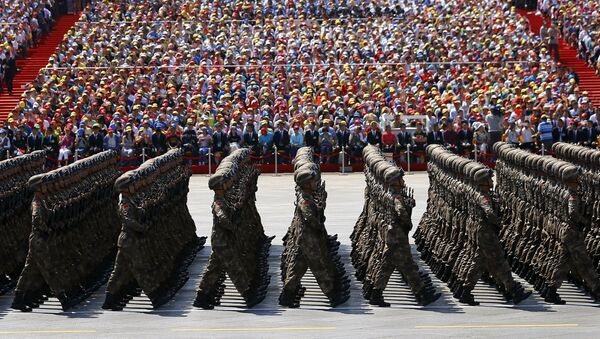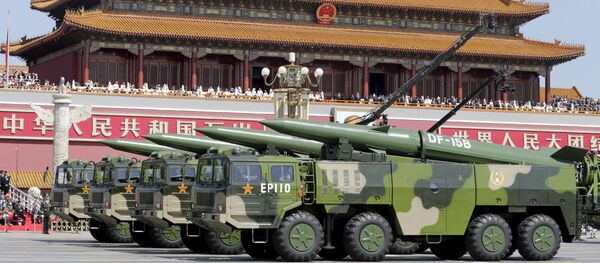With the eyes of the world set on Beijing ahead of the grand parade commemorating the 70th anniversary of the end of the Second World War, Xi stressed that his country "will remain committed to peaceful development," emphasizing the point by declaring: "Here, I announce that China will cut the number of its troops by 300,000."
The cuts are equivalent to a 13 percent reduction in the size of the country's 2.3 million-strong People's Liberation Army. Russian experts believe them to be part of a continued military restructuring program, with the cuts expected to take place over the course of one-to-two years, via reduced recruitment and natural attrition, as soldiers serving 2-3 years make their way back into civilian life.
Naturally, Western outlets were quick to voice their skepticism over the measure, with an expert cited by the New York Times suggesting that the cuts were 'window dressing', adding that they will actually free up the country's military budget toward technologically advanced military hardware.
Speaking to Radio Sputnik, China Foreign Affairs University Professor Su Hao noted that the parade was "a very appropriate occasion" for the Chinese president to make the announcement. "The fact that the statement on the reduction of the armed forces was made at the parade only underscores China's desire for peace, its willingness to contribute to the cause of world peace."
Political scientist Vladimir Yevseyev concurred, noting that given China's "territorial disputes with its neighbors…this was a step made not only toward the West, but also toward India, which is in the process of developing nuclear capability which experts say may be directed at China. Beijing will likely wait for some reciprocal steps, I believe, first and foremost from India. China, in this way, is trying to show that it is not an aggressive state. The modernization of the country's armed forces continues, and given improved technical capabilities, such large numbers of personnel are not required."
'No Matter How Strong, China Will Never Seek Global Hegemony'
Amid growing American and Japanese fears of China's expanding economic and military potential, including an increasingly tense situation surrounding territorial disputes in the South China Sea, President Xi attempted to soothe his detractors, pledging that his country would "never seek hegemony or expansion."
In what appeared to be a statement aimed directly at Japan, which cost millions of Chinese soldiers and civilians their lives during its invasion and occupation of much of China and other parts of Asia, Xi emphasized that China "will never inflict its past suffering on any other nation."
Reviving and Preserving Historical Memory
Looking to right the historical wrong of China's underestimated and undervalued contribution to victory in the global war against fascism, which he characterized as a "decisive battle between justice and evil, light and darkness, and between progress and reaction," the leader noted that "the Chinese people held ground in the main theater in the East of the World Anti-Fascist War, thus making a major contribution to victory."
That war first began for China nearly a decade before it engulfed the rest of the world, in September 1931, when Japan invaded Manchuria. Later, after Japanese forces began their invasion of the rest of the then-divided country, Chinese forces ended up tying up a majority of Japanese forces throughout the course of the war, even following the entry of Britain and the US into the war.
Xi emphasized that ultimately, his country's wartime efforts had "crushed the plot of the Japanese militarists to colonize and enslave China, and put an end to China's national humiliation of suffering successive defeats at the hands of foreign aggressors in modern times." In his words, "this great triumph re-established China as a major country in the world and won the Chinese people [the] respect of all peace-loving people around the world."
Imperative for Peace
The president explained that remembering the war "helps us better appreciate the value of peace," adding that while "peace and development have become the prevailing trend" in the world, "the world is far from tranquil [and] war is the sword of Damocles that still hangs over mankind."
The president emphasized the importance of learning "the lessons of history," along with the need to foster "a keen sense of a global community" and a "shared future" in order to avoid cataclysm.
"Prejudice, discrimination, hatred and war can only cause disaster and suffering, while mutual respect, equality, peaceful development and common prosperity represent the right path to take," Xi noted, stressing the need to "build a new type of international relations" on the basis of "win-win cooperation" between nations.
Thursday's grand parade, the country's first such event marking the end of the Second World War, featured over 12,000 troops, 500 armored vehicles, and 200 aircraft. The parade was led by veterans of the war, who were carried in vehicles, and flanked by a 1,000 troop-strong contingent from over a dozen countries, including Russia. The event was attended by the leaders of nearly 30 countries, including the Russian president. Most Western leaders refused to attend.
With 2.3 million personnel, the People's Liberation Army, consisting of four service branches including the Ground Force (1.6 million personnel), the Navy (255,000), the Air Force (400,000) and the Second Artillery Corps (the country's strategic nuclear forces, 100,000 personnel), is presently the world's largest military force. The PLA's budget, equivalent to $141 billion US, or 1.5 percent of the country's GDP, was ranked second in the world behind that of the United States ($581 billion, 3.3 percent of GDP in 2015). China's efforts to modernize its armed forces has been intensely criticized by Western observers, although Beijing has repeatedly emphasized that its efforts are aimed at preserving peace through a fairer global balance of forces.






